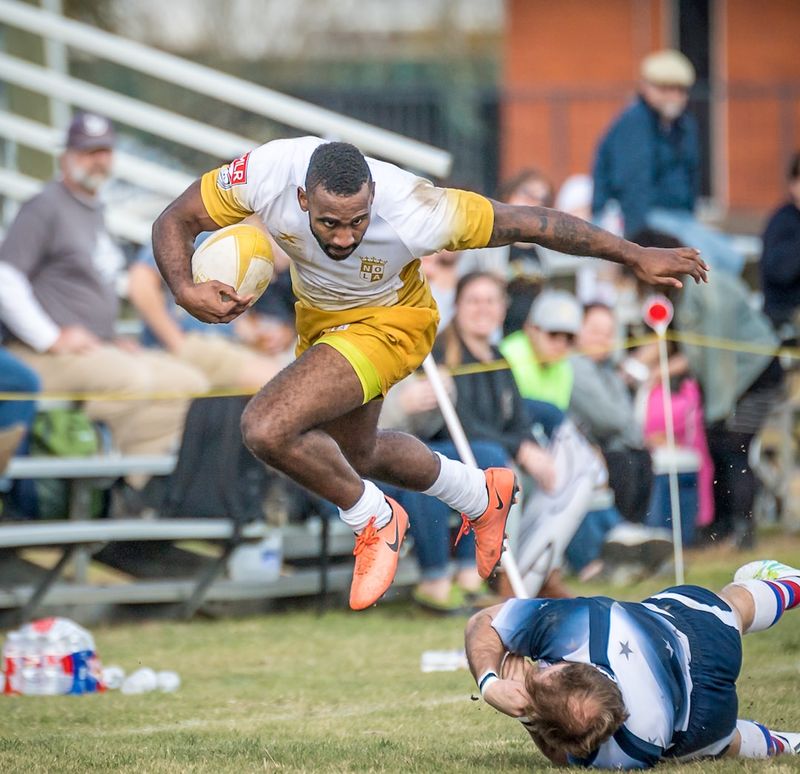Rugby World Cup 2023: Josua Tuisova Plays on After Tragic Loss
A Heartbreaking Loss
In a devastating turn of events, Fiji‘s center, Josua Tuisova, received the news of his seven-year-old son’s passing, Tito, just before his team’s match against Georgia on Saturday at the Rugby World Cup. Despite the immense grief and tragedy, Tuisova decided to continue playing, staying in France to help Fiji secure qualification for the quarter-finals.
Unyielding Spirit
Tuisova’s decision to play in the face of such a personal tragedy demonstrates his unyielding spirit and commitment to his team. The Fijian center’s dedication to rugby and his teammates is an example of the passion and strength that drives players in their pursuit of success and resilience in the face of adversity.
A Bittersweet Victory
Fiji‘s victory against Georgia, overcoming a 9-0 halftime deficit to win 17-12, was undoubtedly bittersweet for Tuisova. As he played a crucial role in securing the win, he undoubtedly carried the weight of his personal loss on his shoulders. It is a testament to his character and strength that he was able to perform at such a high level during such a difficult time.
A Fateful Funeral
Tragically, Tuisova was unable to attend his son’s funeral, which took place in Votua, Ba on Tuesday morning. Tuisova’s father, Isikeli Ratulevu, shared that the 29-year-old expressed his inability to attend due to his commitment to the Rugby World Cup and Fiji‘s crucial match against Portugal. The funeral notification revealed that Tito had passed away after a prolonged battle with a debilitating illness, highlighting the immense pain that this young boy endured.
The Role of Sport in Times of Tragedy
Philosophical Reflections
Tuisova’s heartbreaking situation raises questions about the role of sport in times of personal tragedy. While it is undoubtedly commendable that Tuisova chose to continue playing to honor his son and support his team, it is essential to reflect on the societal expectations placed on athletes. Should individuals in such circumstances be expected to carry on as if nothing has happened, or should considerations be made for their personal grief and healing process?
The Power of Sports in Healing
Sports can provide an avenue for healing and a temporary escape from personal troubles. For some, continuing to play may be a way to find solace and strength within a supportive community. However, the question remains whether the pressure to perform and meet professional obligations should take precedence over personal mourning and reflection.
An Editorial on Support and Empathy
A Call for Compassion
Tuisova’s decision to play amidst such tragedy should prompt a broader conversation about providing support and empathy to athletes facing personal hardships. It is important for sports organizations and communities to recognize the emotional well-being of their athletes and provide resources for them to navigate challenging situations securely.
Balancing Expectations and Compassion
While it is crucial to support and respect an athlete’s decision, it is also essential to strike a balance between professional expectations and personal well-being. The case of Josua Tuisova highlights the need for sports organizations to have policies and support systems in place for athletes facing personal tragedies, allowing them the space and time they need to mourn and heal.
Advice for Athletes and Organizations
Caring for Athletes’ Mental Health
Sports organizations should prioritize the mental health and well-being of their athletes. This includes creating a supportive environment that fosters open communication, offering counseling services, and being understanding of personal circumstances that may impact an athlete’s performance.
Flexible Policies
Organizations should consider implementing flexible policies that allow athletes to take the necessary time off to grieve and attend to personal matters. This understanding and flexibility can help athletes navigate the challenges they face outside of their sporting careers while still feeling supported by their teams and organizations.
A Call to Empathy
As fans and spectators, we should also strive to approach these situations with empathy and understanding. Recognizing the difficulties athletes may be facing behind the scenes and offering our support can go a long way in helping them through challenging times.
In conclusion, Josua Tuisova’s decision to continue playing at the Rugby World Cup after the tragic loss of his son highlights the complex intersection of sports and personal tragedy. It calls for a deeper examination of the expectations placed on athletes and the need for empathy and support within the sporting community. It is crucial for sports organizations and society as a whole to prioritize the mental well-being of athletes and create an environment that allows them to navigate personal hardships while receiving the support they need.

<< photo by Craig Boudreaux >>
The image is for illustrative purposes only and does not depict the actual situation.
You might want to read !
- “Cricket Clash Down Under: Australia Triumphs Over Pakistan in World Cup 2023 Warm-Up”
- “Battle for Points: Luton vs Burnley LIVE Commentary as Kompany Takes Charge”
- Kevin Muscat Seeks Talks for Rangers Manager Role: Salvaging the Ibrox Ship
- Football Fan Mockery: Dale Houghton’s Potential Jail Time Sheds Light on the Limits of Freedom of Expression
- Celebrity SAS Star Michelle Heaton’s Shocking Hostage Situation and the Realities of Reality TV
- South Africa Dominates Tonga in Action-Packed Rugby World Cup 2023 Clash
- “Shifting Tides: Wales and England Ascend in the Rugby World Cup Power Rankings”
- Evaluating the Impact: Ireland’s Victory over Tonga in the Rugby World Cup
- Auctioning Off the Iconic James Bond Ski Suit: A Look at the Influence of Film Fashion
- Driven from Home: TV Historian David Olusoga’s Personal Journey of Displacement and Resilience
- Stride Vows to Expedite Child Maintenance Enforcement Process: A Step Towards Ensuring Financial Security of Children?
- “The Unyielding Spirit of Kieran Tierney: Rallying Arsenal Diehards Amidst Tomiyasu’s Red Card”




